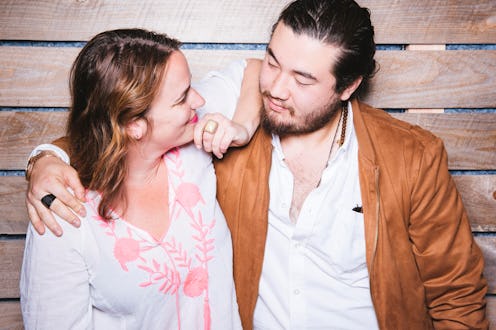Life
How To Make It More Likely Your Partner Will Apologize For Something They Did Wrong

When my ex cheated on me, the first thing my therapist said to me was, "It's easier to ask forgiveness, than it is to ask for the permission." At the time, stewing in anger, rage, and humiliation, I dismissed this reasoning. But, looking back, what she said made perfect sense: apologizing and asking for forgiveness is easier. Especially if you and your partner have had conversations that reinforce that an apology will be given, if there's a chance it will be accepted.
Although it took me a long time to forgive my ex, I finally did. While we didn't end up getting back together, we were able to create a different type of relationship, a friendship, and it was in that space that he was able to apologize, I was able to forgive, and we were able to move on with our lives, having realized we were never a very good fit anyway.
But in relationships where the partnership is a good fit and worth saving, no matter what's been done, you need to set a tone and an environment in which your partner is comfortable admitting they're wrong and apologizing for it. To set that environment, you need to communicate. Here are seven conversations that make it more likely your partner will apologize for something they did wrong.
1Explore The Motivation Behind The Behavior
Instead of jumping into an argument, try to examine the motivation behind whatever was done or said that needs apologizing. And do so in the present; meaning, shelf whatever experiences you had with other partners in the past.
"Don’t let your past relationship failures interfere with your present or future relationships," Clarissa Silva, behavioral scientist/relationship coach and creator of Your Happiness Hypothesis Method, tells Bustle. "Ask yourself: What motivated [this] behavior? Was it past hurt?"
2Accept Responsibility
If you expect your partner to be more likely to apologize for something they did wrong, then you need to play the same game. You need to be just as open, frank, and honest. What that means is sucking it up and accepting responsibility for your mistakes, too.
"Taking responsibility for one's own actions is a personal thing, not a couple thing," says Silva. "It’s based on the individual’s personal decisions and choices. Acknowledge that you messed up and apologize for any hurt you may have caused your partner."
3Discuss The Importance Of Vulnerability
To be able to admit that you're wrong and apologize for it, requires a level of vulnerability from both partners. If you put it out there that vulnerability is a good thing and paramount to the success of the relationship, you're more likely to get an apology when you deserve it.
"Be vulnerable yourself," relationship experts Dana Lam and Martin Kupper tell Bustle. "If you open up and share scary thoughts and feelings with your partner they will be more likely to be vulnerable with you."
4Don't Make Excuses For Bad Behavior
If, in conversations with your partner, you've made excuses for your own actions instead of apologizing, you're setting a precedence in which apologies aren't part of the equation.
"Not taking responsibility for one’s actions can lead to devaluing the other person," says Silva. "Whether it was a tough day and you took it out on them or you’re just in a bad mood, acknowledge that you misplaced your discontent on them and you didn’t mean to."
5Discuss A Strategy For The Future
"Discussing what created tension, stopped you from listening, or how to not hurt one another in that same way will help you let go of resentment and create a healthier relationship pattern," says Silva.
In other words, learn from your mistakes and try to prevent them from happening again. That way, you can trust that an apology will be given when it should be.
6Honor Both Your Opinions
"Summarize, anticipate, and formulate questions based on what you’re hearing," says Silva. "Strategize by moderating your reaction as the person is talking to you, then respond. The speed at which your thoughts and speech work are two different frequencies. That allows you time to avoid the pitfall of another fight, being misunderstood, or expressing the wrong emotions."
7Let Them Know You're Capable Of Forgiveness
If you want your partner to apologize, then they need to know that forgiveness is in the cards. No matter how hard it might be for you.
"It can be hard to admit you're wrong," Sasha Bracha Bregman, rabbi and professional matchmaker, tells Bustle. "As such, when someone freely does so, and apologizes to you, it's a sure sign that they're trying to get closer to you and mend any breaches in your relationship. When an apology seems to be sincere, accept it!"
Although difficult in their own ways, apologizing and forgiveness aren't easy. But if you communicate with your partner about both these topics in an open-minded way, you can get your apology and they can get their forgiveness.